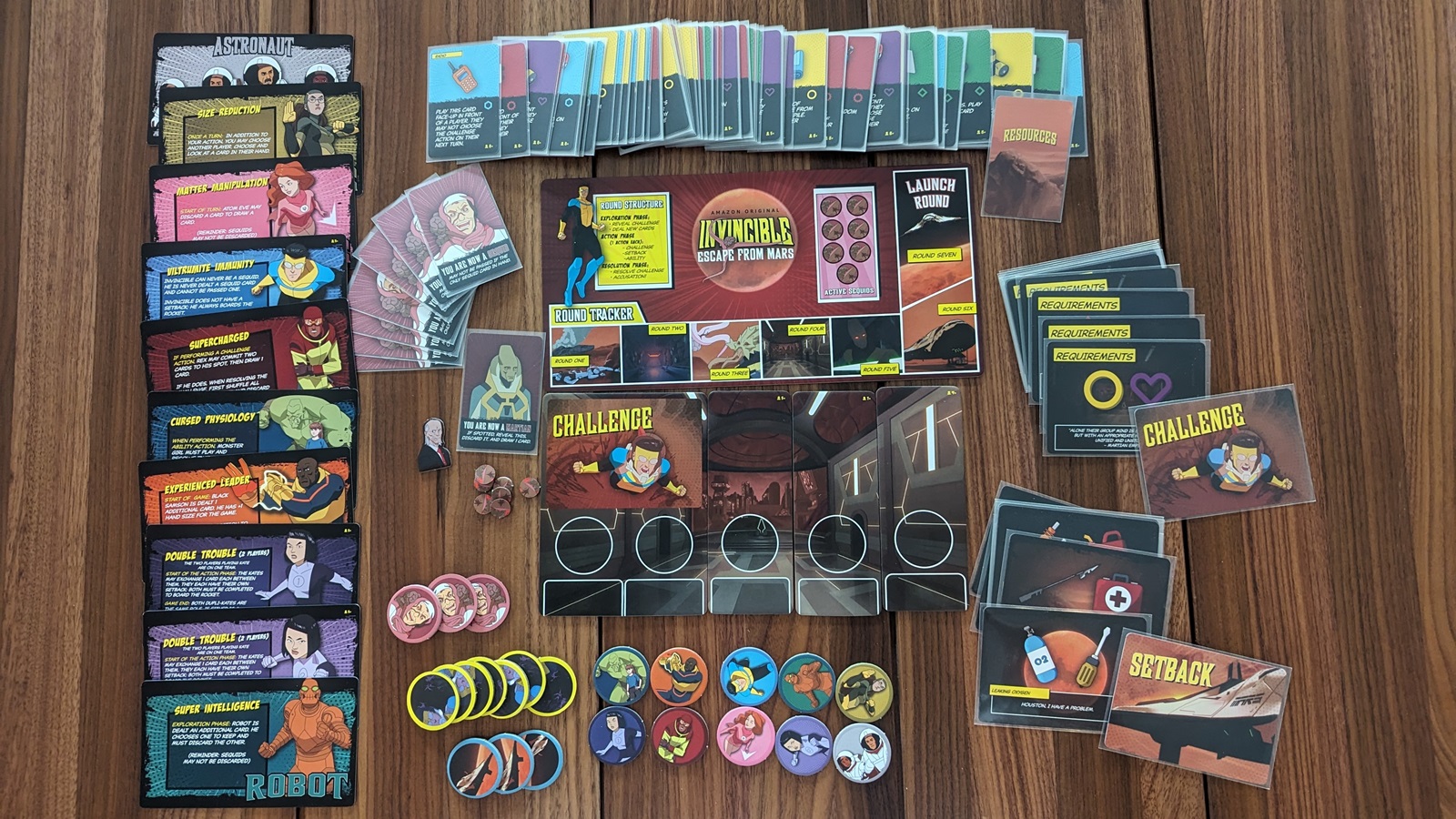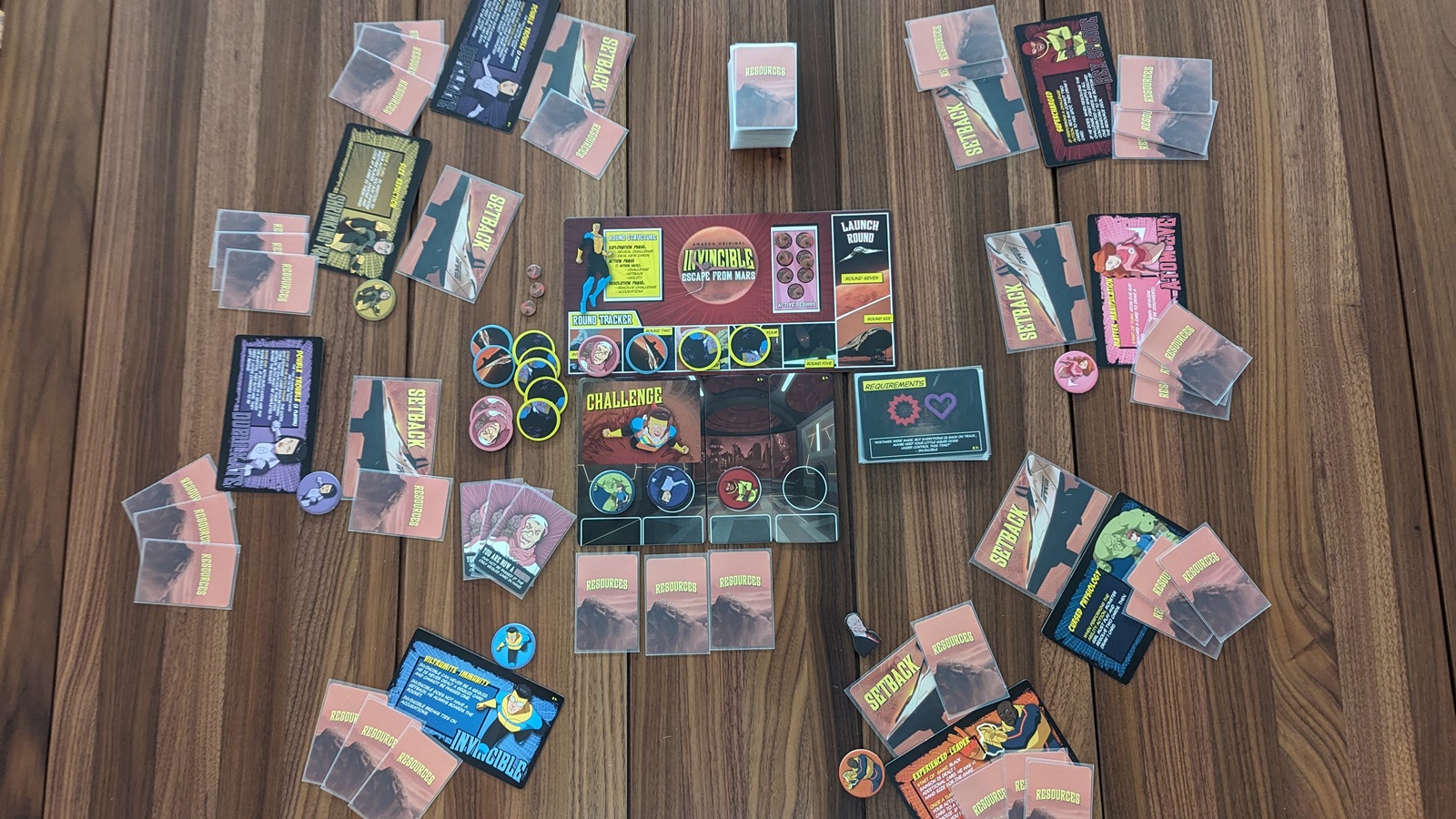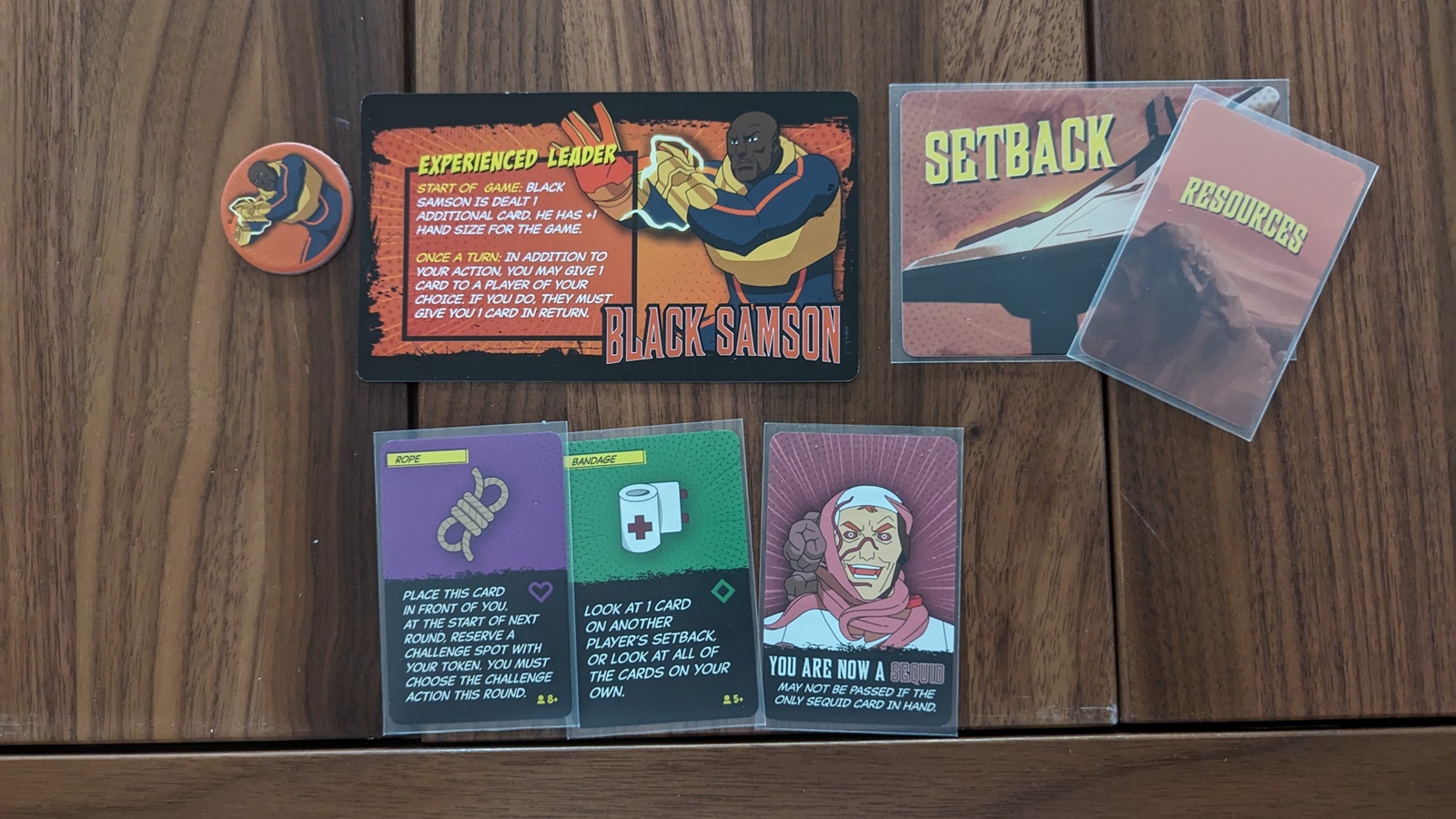
When I learned there was going to be a social deduction game based off of the Invincible TV series I was pretty dumbfounded. Why Invincible? Isn’t he… invincible? After that initial reaction, my curiosity reached past my confusion so I went to see what this game is all about. Invincible: Escape from Mars is a social deduction game that plays up to ten players and is mostly based on the lineage of The Resistance games. Escape from Mars is themed on the arc of the TV show where Invincible and friends are sent to save astronauts from a manned mission to Mars. There the heroes encounter the parasitic Sequids who are trying to impersonate someone in order to infiltrate Earth. I have to admit, that’s a good setup for this type of game. You had my curiosity, now you have my attention. (Insert that meme here.)
Overview
I’m going to be brief about my explanation of the game because if you’re familiar with social deduction games, you’ll basically be able to sing along with me. There are two teams: the humans who are trying to complete three challenges or escape on the rocket with only humans, or the Sequids who want to sabotage three challenges or escape on the rocket. Unlike other social deduction games, you won’t be given an allegiance card, instead your allegiance is determined with your resource cards. Hidden in the resource cards are Sequid cards and if you ever acquire one, you are now a Sequid. The game is very specific in that players cannot ever give away their last Sequid card, but if they have more than one they are free to play them onto other players. Players also have a setback card in front of them indicating what two resources they need in order to leave on the rocket. On your turn you can play a card facedown into the challenge, play a card facedown to anyone’s setback, or play a card faceup for its text effect. There is always someone playing as Invincible. Invincible cannot be infected and Invincible is always on the human team.

The components that come with Invincible: Escape from Mars
At the end of every round Invincible checks the cards played into the challenge to see if that challenge went to the human, Sequids, or neither. Then players are encouraged to discuss who they think are Sequids and vote. The player who receives the most votes must discard any Sequid cards in hand and then returns to the human team. At the start of each round one more Squid card is added into the resources being distributed to the players. This means that potentially, each round a player is being converted to the Sequid team. If you ever run out of Sequids to add, the Sequids immediately win. Play continues this way until the end of round seven where players determine who can board the rocket and which team wins. There’s a bit more going around such as asymmetrical player powers and the way the rocket voting works. Escape from Mars is essentially a new recipe of familiar social deduction elements that has been blended to create something new. So, how does this particular concoction fare?
Pros
This game plays well at higher player counts and is easy to play once you get going. On your turn you’re doing one of three actions so turns are usually quick. Despite being from the Avalon/Secret Hitler family tree, I can say that Escape from Mars does a good job of differentiating itself from other games similar in style. The main innovation here is the escalating number of Sequids. During setup Sequid cards are randomly distributed among the players (not to Invincible) and each new round brings out another Sequid. Humans must actively hunt the Sequids otherwise humans will be overwhelmed at some point thus losing them the game. The Sequids add a tension into the game from round to round as players you once trusted take actions that suddenly seem out of character. Like any good social deduction game, players of any allegiance will have reasons to take any action, but those actions cast suspicion on you. As games progress you’ll spend time observing the actions players take and try to determine if someone is being consistent in their play. While the gameplay here isn’t quite as buttery smooth as similar games, it’s still very good. Anything that prompts discussion on, “Why did you do that?” makes for a great social deduction experience.
The challenge each round also proves crucial as it cannot be ignored by either team. Only a certain number of players can play into the challenge each round so not everyone will be able to contribute/harm it. If a team swings three challenges to their side they’ll just win outright, so Sequids must play into the challenge at some point. This forces some information as to where the Sequids are hiding. This information is crucial for the humans for their end of round votes.

An eight player game of Invincible: Escape from Mars
Each player having a setback card also facilitates suspicion. Players may be genuinely helping you, but since those cards are played faced down you won’t know. Did Bob give you the med kit you so sorely need or did he just secretly turn you into a Sequid? You might want to use a card’s action that lets you check facedown cards, but this means you’re not helping the challenge. Because you can change teams throughout the game there’s quite a lot of strategy that can be employed as you play. You could play your second Sequid card on your own setback ensuring that you will remain on that team, but it also means you’re at risk of someone finding it.
I would also recommend playing with the superhero side of the player boards. The unique player powers help to give everyone a sense of identity and allow for more choices from round to round. I don’t know a ton about Invincible the TV show/comic, but the player powers seemed thematic from my base understanding.
Cons
As the game doesn’t use allegiance cards the setup is a bit convoluted. The person playing Invincible has to be careful to ensure the correct number of Sequid cards are distributed at the beginning of each round. While not a huge deal, it did take us a couple of games to get used to this. The person playing Invincible has a bit of responsibility as they help run the game and I found that not everyone wants to be Invincible.
If you do end up being a Sequid, you usually don’t know who your teammates are. Sometimes you’ll know when someone converts you, (such as in a card trade) but most of the time you won’t be able to trace the conversion. It’s also possible to not even know you are a Sequid since the cards played on setbacks are facedown. You can believe you’re a loyal human all game helping to ensure human victory only to find out you’re not human. That can feel bad. Constantly changing teams isn’t for everyone as it can be quite mentally taxing. I don’t mind having my team switched midgame, but I prefer being able to know my role in a social deduction game. Do I want to be the blatant bad guy or the sneaky one? If my team is always changing it’s hard to play a longer term strategy.

Black Samson is secretly a Sequid, but the facedown card on their setback could also be a Sequid card
Should a game reach all the way to the seventh round the rocket voting is also somewhat confusing. You will usually want to clarify how the voting works when a game reaches this as it doesn’t always happen. The end game win conditions also bear rechecking as there are separate conditions for humans on the rocket or left behind. All the rules make sense, but I usually had to double check them.
There’s one role I haven’t talked about called The Martian. They are a solo role that wants the game to reach the rocket round as their goal is to leave with the humans and not allow any Sequids to leave. Should this happen, The Martian wins alone. I’m not a fan of these “balancing” roles as they tend to drag out games and players have mixed reactions to them. Some players embrace the challenge of being alone, while others see it as a hopeless struggle. Like the other roles, The Martian role may fall into your lap midway through a game whether you want it to or not.
Lastly, I have a small note on the components. When I saw that the Sequid cards would be distributed randomly into the resource cards I immediately sleeved everything. I am careful with social deduction games so that the cards cannot give any information away, but this step is ultimately unnecessary. The components are fine overall, though I with the player boards were thicker cardboard.
Invincible: Escape from Mars
Good
Invincible: Escape from Mars is a fun social deduction game. The game sets itself apart by forgoing the traditional allegiance cards and instead seeding Sequid cards among the players. Humans have to be active in their search for Sequids. Each new round escalates as another Sequid card is seeded among the players. While having your team change midgame might not be for everyone, this game has an innovative twist on the social deduction genre. Whether you’re a social deduction fan looking for something different or you’re just a fan of Invincible, Escape from Mars is a fun game that plays well with all kinds of people.
Pros
- The pressure to find the Sequids is unique
- The unique player powers are fun and thematic
Cons
- Setup is a little complicated
- Constantly changing teams isn’t for everyone